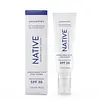Pacifica Sea & C Protect SPF 45 Matte Sheer Setting Mist Versus Native Mineral Face Sunscreen SPF 30
What's inside
What's inside
 Key Ingredients
Key Ingredients

 Benefits
Benefits

 Concerns
Concerns

 Ingredients Side-by-side
Ingredients Side-by-side

Octocrylene 2.9%
UV AbsorberAlcohol Denat.
AntimicrobialButyloctyl Salicylate
Skin ConditioningDiheptyl Succinate
EmollientSilica Silylate
EmollientCoconut Alkanes
EmollientParfum
MaskingTetrahexyldecyl Ascorbate
AntioxidantAlgae Extract
EmollientAscophyllum Nodosum Extract
Skin ConditioningLaminaria Digitata Extract
Skin ProtectingWater
Skin ConditioningHelianthus Annuus Seed Oil
EmollientHydrolyzed Jojoba Esters
Skin ConditioningGlycerin
HumectantBisabolol
MaskingCapryloyl Glycerin/Sebacic Acid Copolymer
Skin ConditioningCoco-Caprylate/Caprate
EmollientEthyl Ferulate
AntioxidantOctocrylene 2.9%, Alcohol Denat., Butyloctyl Salicylate, Diheptyl Succinate, Silica Silylate, Coconut Alkanes, Parfum, Tetrahexyldecyl Ascorbate, Algae Extract, Ascophyllum Nodosum Extract, Laminaria Digitata Extract, Water, Helianthus Annuus Seed Oil, Hydrolyzed Jojoba Esters, Glycerin, Bisabolol, Capryloyl Glycerin/Sebacic Acid Copolymer, Coco-Caprylate/Caprate, Ethyl Ferulate
Zinc Oxide 20%
Cosmetic ColorantWater
Skin ConditioningCaprylic/Capric Triglyceride
MaskingCoconut Alkanes
EmollientGlycerin
HumectantCetearyl Alcohol
EmollientCoco-Glucoside
CleansingArachidyl Alcohol
EmollientBehenyl Alcohol
EmollientArachidyl Glucoside
EmulsifyingPolyhydroxystearic Acid
EmulsifyingBenzyl Alcohol
PerfumingXanthan Gum
EmulsifyingCoco-Caprylate/Caprate
EmollientTocopherol
AntioxidantPersea Gratissima Oil
Skin ConditioningHelianthus Annuus Seed Oil
EmollientZinc Oxide 20%, Water, Caprylic/Capric Triglyceride, Coconut Alkanes, Glycerin, Cetearyl Alcohol, Coco-Glucoside, Arachidyl Alcohol, Behenyl Alcohol, Arachidyl Glucoside, Polyhydroxystearic Acid, Benzyl Alcohol, Xanthan Gum, Coco-Caprylate/Caprate, Tocopherol, Persea Gratissima Oil, Helianthus Annuus Seed Oil
 Reviews
Reviews

Ingredients Explained
These ingredients are found in both products.
Ingredients higher up in an ingredient list are typically present in a larger amount.
Coco-Caprylate/Caprate is created from fatty coconut alcohol, caprylic acid, and capric acid.
It is a lightweight emollient. Emollients create a thin barrier on the skin to trap moisture in. This helps keep your skin hydrated and soft.
Once applied, Coco-Caprylate/Caprate is absorbed quickly and leaves a silky feel.
Coco-Caprylate/Caprate may not be fungal acne safe.
Learn more about Coco-Caprylate/CaprateCoconut Alkanes is created from the fatty-acids of coconut oil. It is volatile, meaning it evaporates from the skin.
This ingredient is an emollient and solvent. As an emollient, it helps keep skin soft and hydrated. Solvents help distribute and mix other ingredients. This ensures a more even consistency.
Coconut Alkanes may not be fungal-acne safe.
Learn more about Coconut AlkanesGlycerin is already naturally found in your skin. It helps moisturize and protect your skin.
A study from 2016 found glycerin to be more effective as a humectant than AHAs and hyaluronic acid.
As a humectant, it helps the skin stay hydrated by pulling moisture to your skin. The low molecular weight of glycerin allows it to pull moisture into the deeper layers of your skin.
Hydrated skin improves your skin barrier; Your skin barrier helps protect against irritants and bacteria.
Glycerin has also been found to have antimicrobial and antiviral properties. Due to these properties, glycerin is often used in wound and burn treatments.
In cosmetics, glycerin is usually derived from plants such as soybean or palm. However, it can also be sourced from animals, such as tallow or animal fat.
This ingredient is organic, colorless, odorless, and non-toxic.
Glycerin is the name for this ingredient in American English. British English uses Glycerol/Glycerine.
Learn more about GlycerinHelianthus Annuus Seed Oil is the oil derived from the seeds of a Sunflower. Sunflower seed oil is non-fragrant. It is an emollient, meaning it helps to soften the skin.
Sunflower seed oil contains many fatty acids. The fatty acids found in sunflower seeds include (from highest amount to least): linoleic acid, myristic acid, palmitic acid, stearic acid, arachidic acid, oleic acid, and linolenic acid.
These fatty acids help the skin create ceramides. Ceramides play a role in repairing the skin barrier.
Helianthus Annuus Seed Oil helps moisturize the skin. This in turn helps the skin look more rejuvenated and smoother.
Sunflowers are rich in vitamin E.
Historians believe Indigenous cultures of North America domesticated sunflowers before corn. Thus they relied on sunflower oil for a variety of uses. One such use is moisturizing skin and hair.
Sunflower seed oil may not be fungal acne safe. We recommend speaking with a professional if you have any concerns.
Learn more about Helianthus Annuus Seed OilWater. It's the most common cosmetic ingredient of all. You'll usually see it at the top of ingredient lists, meaning that it makes up the largest part of the product.
So why is it so popular? Water most often acts as a solvent - this means that it helps dissolve other ingredients into the formulation.
You'll also recognize water as that liquid we all need to stay alive. If you see this, drink a glass of water. Stay hydrated!
Learn more about Water